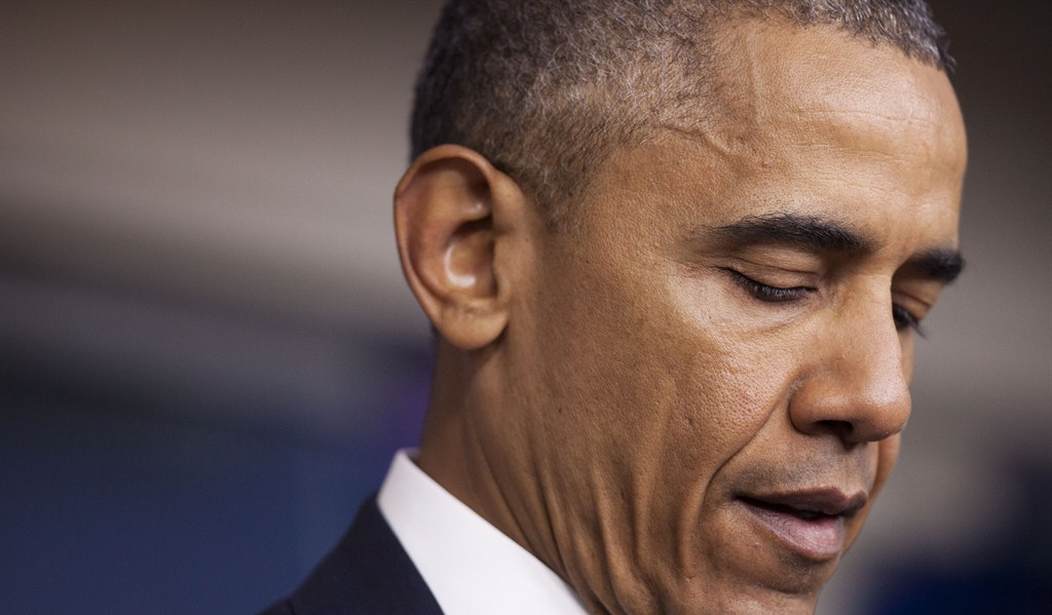Following last year's strong Q3 GDP growth number and mediocre progress in Q4, the US economy barely expanded at all in the first quarter of fiscal year 2015 -- even failing to live up to economists' paltry expectations. The uneven, halting, tepid Obama "recovery" continues, via the Wall Street Journal:
Advertisement
The U.S. economy slowed sharply at the start of the year as businesses slashed investment, exports tumbled and consumers showed signs of caution, marking a return to the uneven growth that has been a hallmark of the nearly six-year economic expansion. Gross domestic product, the broadest measure of goods and services produced across the economy, expanded at a 0.2% seasonally adjusted annual rate in the first quarter, the Commerce Department said Wednesday. The economy advanced at a 2.2% pace in the fourth quarter and 5% in the third. Economists surveyed by The Wall Street Journal had expected growth of 1% in the first three months of this year.
The Journal expands on America's uninspiring new normal, noting that a expectations for a second quarter rebound have been "muted:"
The first-quarter figures repeat a common pattern in recent years: one or two strong readings followed by a big slowdown. Before this year, first-quarter GDP growth had averaged 0.6% since 2010 and 2.9% for all other quarters. That has worked out to moderate overall expansion but no sustained breakout for the economy. ast year, economists pinned much of the blame for a bad first quarter—GDP shrank 2.1%—on unusually harsh weather. This year, multiple factors appear to be at work, including another bout of blizzards, disruptions at West Coast ports, the stronger dollar’s effect on exports and the impact of cheaper oil. And while most economists expect another second-quarter rebound, some forecasts are muted. Ahead of Wednesday’s GDP release, for example, J.P. Morgan Chase was predicting only a 2.5% pace in the second quarter. Wednesday’s report showed consumer spending, which accounts for more than two-thirds of economic output, decelerated to a 1.9% pace in the first quarter, down from 4.4% growth in the fourth quarter.
Recommended
Advertisement
Our feeble progress, illustrated:

Hillary Clinton will reportedly run on President Obama's economic and domestic record, trying to make the case that her fellow liberal Democrat made important headway. But she also has no choice but to step on that message a bit, lamenting the "stalled out" economy recently, for instance. Unless the US economy manages to overcome Obama's record over the next year-plus, Mrs. Clinton's political gymnastics on the matter will be rather treacherous. I'll leave you with a note on Obamacare, which the nonpartisan Congressional Budget Office has repeatedly found to be a wet blanket on America's economic advancement. We told you this was coming, and so it has:
Nearly two in three Americans who bought subsidized health insurance on the Obamacare exchanges this year had to pay some of the federal dollars back, according to new data from H&R Block. That's because they presumably collected more federal aid than their income qualified them for. In that case, consumers must either pay some of it back or — in most cases — the IRS will subtract it from their tax refund. Policymakers have expressed concern that low-income people could struggle with paying back the subsidies — or suffer if their tax refunds are greatly reduced because of overpayments. The average amount consumers owed back to the government was $729, cutting their potential tax refunds by almost one-third, said the tax preparation company.
Advertisement
These government errors are largely attributable to the online health portals' yet-unfinished "back end." The latest Fox News poll shows Americans disapproving of Obama's handling of healthcare by a double-digit margin. Obama originally campaigned against what became his own law's central tenet: The unpopular individual mandate tax. That was Hillary Clinton's plan.
























Join the conversation as a VIP Member